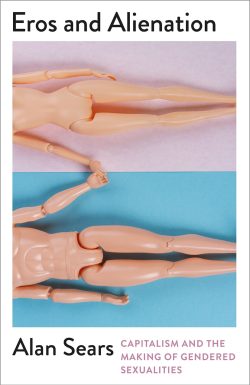What is the relationship between Marxism and hope? Understood mechanically, historical materialism would have no need for hope—if history is merely a linear progression of stages moving steadily towards the highest social form, then communism is simply the inevitable outcome of this evolutionary process. But if emancipation means more than a fated change in the mode of production—if it requires the political activity of conscious subjects a flourishing human society—then Marxism must understand human nature as open-ended, unfinished, and able to find both its realization and aspiration in a future strikingly different from the present.
In Eros and Alienation, Alan Sears grounds a utopian vision of a qualitatively different future in the concrete relations of the present through an analysis of our creative lifemaking activity—that is, our “species-being”—with particular attention paid to its erotic dimensions.1Karl Marx, Economic and Political Manuscripts of 1844 (Moscow: Progress Publishers, 1977), 75. While capitalism has reduced this activity to a means of survival—something we exchange for the wages we need to pay rent and buy groceries—it has not, and indeed cannot, fully extinguish this essentially human character. Sears highlights the incomplete and contradictory nature of capitalist alienation, while consistently emphasizing people’s capacity to resist it and, in the process, transform themselves and the world around them. By bringing historical materialism into conversation with queer utopian thought, Sears encourages us to think and act beyond the possibilities offered by capital and the state while remaining grounded in concrete forms of struggle from below.
Sears mobilizes a broad understanding of eros rooted in the notion of lifemaking activity as human fulfillment, instead of a more limited and confined understanding of sexuality. Likewise, the concept of work goes beyond wage labor, encompassing all lifemaking activity, including “caring, aesthetic expression, physical performance and social belonging.”2Alan Sears, Eros and Alienation: Capitalism and the Making of Gendered Sexualities (London: Pluto Press, 2025), 22, https://doi.org/10.2307/jj.13286029. Drawing from elements of Social Reproduction Theory (SRT) such as Susan Ferguson’s expansive concept of labor, Sears explains how work includes worldmaking for ourselves, and not just profitmaking for others.3Sears, Eros and Alienation, 5. Sears’s framework is founded on the fact that this creative activity comprises sensuous, material, social, and aesthetic fulfillment.4Sears, Eros and Alienation, 23. Eros, then, contains sexuality while exceeding it. At the same time, focusing on creative activity as the locus of eros reveals the historical nature of needs and desires.
By bringing a historical materialist framework to the study of the making of gender, sexuality, and desire, Sears situates the containment of gender and sexual expression within the specifically capitalist conditions of alienated labor and goes beyond dichotomous understandings of gendered sexuality that view it as either a feature of human nature or an abstract indeterminate social phenomenon. While the erotic realm is interwoven with biological impulses, these are expressed in different ways according to the specific sociohistorical form human organization takes.5In the sections “Capitalism and Alienated Making” and “Sexuality and Embodiment in Second Nature,” Sears focuses on the emergence of the sexual realm specifically, but also understands this framework as applicable to other lifemaking activities. As Sears states, “it is precisely the combination of biology and culture that makes human sexuality what it is and what it could be.”6Sears, Eros and Alienation, 6. Human activity satisfies our needs while also transforming and producing new ones, highlighting both its and eros’ open-endedness.7Karl Marx and Frederick Engels, The German Ideology (Moscow: Progress Publishers, 1976), 48; Sears, Eros and Alienation, 28.
After a brief exposition of Sears’s rich conceptions of alienation, eros, and labor in the initial section, the following two sections of this piece will interrogate the application of these concepts to the ecological crisis: In the second section, we outline some ambiguities in Sears’s reconfiguration of Jason Moore and Neil Smith’s conception of first and second nature, arguing that the liberatory possibilities Sears sees in Indigenous forms of ecological resistance sit uneasily with the ecomodernist implications of Smith’s monism; in the third section, we argue that Sears’ notion of alienation might be fruitfully paired with some areas of degrowth communism, as both perspectives see the potential of recovering concrete practices and ways of life from the past as part of a future-oriented struggle. In the concluding section, we explore Sears’s manner of tying the past, present, and future together as central to his understanding of utopia, which emerges from the concrete activity of resistance from below. Utopia provides the throughline that highlights queerness’s centrality for Sears’s project as both disalienating struggle and glimpse of what is to come.
Eros and Alienation in the Broad Sense
Departing from the notion of the unalienated condition as the “complete emancipation of all human senses and attributes” allows for an equally broad and complex reading of alienation.8Marx, Economic and Political Manuscripts of 1844, 101. Alienation severs the ties between humans and their products, activities, and social relations, thus hindering the lifemaking activity at the basis of creative self-realization. Sears’s broad conceptions of both labor and eros as expressions of self-actualizing and transformative activity makes analyzing the the interconnection between eros and the containment of our erotic fulfillment possible. Departing from Marcuse’s notorious analysis of the role of erotic surplus repression in reinforcing the regulation required by capitalist society, Sears explores the relationship between erotic containment and capitalist alienation and, specifically, the separation of work from its sensuous and social aspects that fragments humanity’s lifemaking capacities.9Sears, Eros and Alienation, 30. Sexual repression in the early nineteenth century played a central role in redirecting human activity away from the fulfillment of biological and social needs (including erotic ones) and towards the production of surplus-value in factories through the implementation of temporal forms of discipline and the division between the spheres of work and enjoyment.10Sears, Eros and Alienation, 40. This not only encouraged a more productive workforce, it also created a more disciplined and subordinate working class. At the same time, Sears incorporates a queer perspective in order to underline the connection between alienation and the capitalist limitation of queerness and the contribution that the normalization of certain sexualities makes to the historical development of erotic sensibilities and practices coherent with erotic containment.


